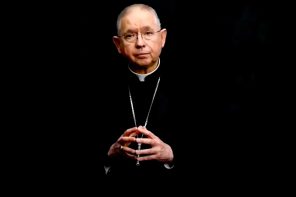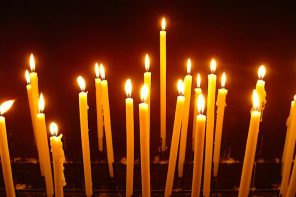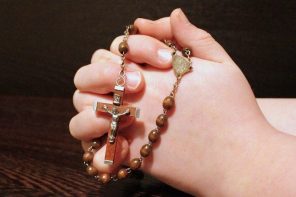“For Jesus, there is no ‘us’ and ‘them.’ There is only us.”
This optimistic paraphrase of Acts 15:9 appeared as a challenge to the audience at a talk that Fr. James Martin, SJ, gave on “How Parishes Can Welcome LGBT Catholics” at last week’s World Meeting of Families (WMF) in Dublin. It was only the second time that a presentation on LGBT Catholics headlined at the WMF, a triennial “congress” organized by the Vatican. But for queer Catholics like me, the painful irony of “There is only us” is that Fr. Martin’s talk focused on “them”—meaning the very LGBT Catholics he seeks to include.
Most recently famous for his controversial book on LGBT Catholics, Fr. Martin does make it clear that he doesn’t speak from the position of the queer Catholics whom he has come to speak on behalf of. He deserves some credit for using his privileged position as a respected Jesuit in order to start conversations about queer sexuality that were previously taboo in the Church. Of course the Vatican allows him to speak about us only because he’s an ostensibly straight priest—emphasis on straight—and thus fits a pattern of who’s given authority in the Church, and who’s deprived of it.
The Vatican invites allies to speak on behalf of LGBT “issues,” though our own voices are silenced. We aren’t considered qualified to speak about our ministry to each other, our theologies, or even our lived experiences as queer Catholics. Sadly, this treatment comes not from benign ignorance, but from a more heartbreaking calculation to preserve the Vatican’s authority over how queer Catholics are depicted in the Church. That theological tradition positions queer Catholics as children, incapable of speaking credibly for ourselves or of the proper moral reasoning required to contribute to all areas of Church life.
This tactic dates back to at least 1997, with the publication of the pastoral message “Always Our Children,” a document distributed in the name of the United States Conference of Catholic Bishops but revised by the Congregation for the Doctrine of the Faith (the latter-day Inquisition). On the surface, the message is one of consolation, offering reassurance to “parents of homosexual children” that they can still love their gay and lesbian sons and daughters. But, like many later commentaries on queer sexuality, including Fr. Martin’s talk, “Always Our Children” centers the alleged grief of parents with gay and lesbian children.
“Always Our Children” describes queer Catholics’ coming-out as “a painful time” for their parents; Fr. Martin said that “Parents of LGBT children face similar pain” as their queer children. The pastoral tone of “Always Our Children” disguises an insidious message: queer Catholics are all (and always) prodigal children who cause our parents suffering with our sexuality. This framework positions us as perpetual children, and children who have strayed from the Church. Such a caricature insists that we never have a mature faith. The theological implication is that our lives within the Church and our grievances against the discrimination we face in the Church may be easily ignored by lay Catholics and clergy alike.
The denial of opportunities to speak for ourselves was even more visible at the previous World Meeting of Families in 2015, when professed celibate Ron Belgau was the only queer Catholic to speak, and he shared the podium with his mother. The visual effect of a forty-year-old gay man deferring to the experiences and expectations of his mother perfectly encapsulates the Vatican’s approach to queer Catholics.
Instead of speaking as his own person, Belgau effectively spoke as a dependent. By including Belgau’s mother and dedicating significant time to her side of the story, the presentation again prioritized heterosexual, parental concerns. In this rendering, queer Catholics cannot independently voice our own concerns or identify solutions. Instead, we must rely on (ostensibly) heterosexual authorities, who alone are granted maturity in the Church.
But why is maturity so privileged within Catholic understandings of the human person? In the strictest theological sense, only baptism, communion, and confirmation secure the sacramental “maturity” of Catholics, as they are the rites signaling our equal membership in Christ’s body. But socially and effectively, there is no way for us to establish ourselves as independent and mature adults in the life of the Church except through marriage, ordination, or religious vows.
The Church treats these as the signs of adulthood, rites of passage indicating that a person has left the “childish” single life to make a lifelong commitment in marriage to a spouse or symbolic marriage to Christ. This creates a conundrum for queer Catholics, as we are cut off from these rites of initiation. We’re forbidden to enter same-sex marriages—even intentionally celibate ones. We’re likewise barred from the priesthood and turned away from religious communities, even when lifelong celibacy is expected of us.
The fact that heterosexuality is the presumed norm, and that heterosexual Catholics don’t have to prove their maturity, is both cause and effect of why the Vatican won’t admit the existence of mature queer Catholics or our capacity to form our own families, including same-sex unions, our children, and our chosen families. Even worse, it takes great pains to erase our existence.
Earlier this year, The Irish Times broke the story that queer families had been edited from some of the educational materials prepared for this month’s meeting. Language about “other unions” that “provide mutual support” was deleted; several stock photos apparently featuring same-sex couples had been deleted or replaced, primarily with photos of beaming heterosexual couples and their happy children. At least as far as the Vatican is concerned, queer Catholics are never spouses, parents, or independent heads of households. We are always and ever our parents’ children.
Like an abusive parent, the Catholic Church dismisses our real needs and our holy talents until they seem irrelevant, all while reinforcing its own authority. If the Church ever hopes to repair the bridges it has burned, it must acknowledge and listen to its queer children as mature adults. If there is truly to be no “us” and “them,” only “us,” then there must be nothing about us without us.




